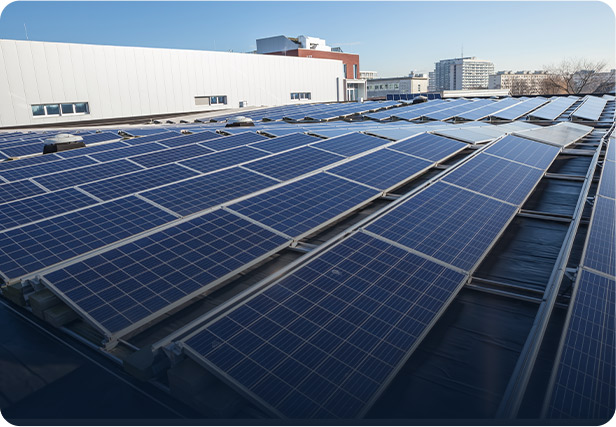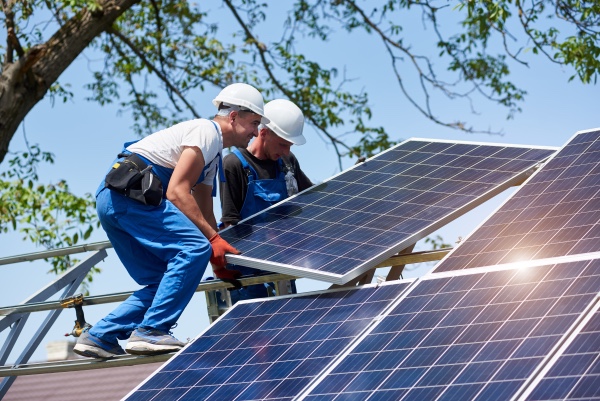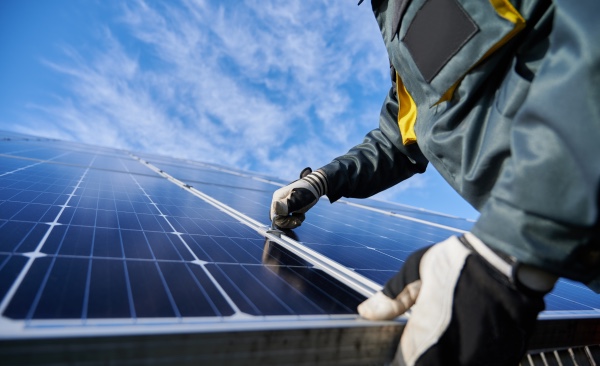
Commercial Solar Panel Installation Services in Texas
With more and more individuals pushing for green energy solutions, commercial businesses can reap many benefits from investing in solar panels. Customers are looking for companies that show concern and commitment to helping the environment, and federal and local governments often give tax breaks to businesses that implement sustainable and forward-thinking technology. On top of these benefits, solar panels can also help cut overall energy costs, giving companies a significant return on their investment (ROI).
The experienced commercial electricians at E-MC Electrical can help you find and install the perfect solar panel solution for your business. We start each service by learning about your company’s electrical needs and providing solutions that fit your budget and goals.
Why Should I Invest in Solar Panels for My Business?
The State of Texas is known for its extreme heat during the summer months and continued warm temperatures throughout much of the year. These consistently warm temperatures result in businesses using a lot of electricity to run AC units to keep their building cool. In addition to other appliances that draw significant energy, such as refrigerators, computers, and lighting systems, it is understandable that businesses want to find a way to stabilize their bill. Solar panels can achieve this by creating a set electricity rate, unlike grid electricity, which can increase and decrease throughout the year. For example, if solar electricity costs you 8 cents per kWh when you get it installed in 2024, this rate will be consistent for years to come. Consistent electricity costs for solar panels allow businesses to be more consistent in their service pricing instead of raising and lowering prices to meet the fluctuating rates of using power grid electricity.
Other financial advantages that business owners gain from investing in solar panel installation are as follows:
- 30% Federal Investment Tax Credit
- 5 Years MACRS Asset Depreciation Schedule
- Utility Rebates and Performance-Based Incentives
- Property Assessed Clean Energy (PACE) Financing
- A Grant of Up to 25% of the Project Cost for Rural Businesses (USDA’s Rural Energy for America Program)
What Types of Businesses Can Benefit From Solar Panels?

Many types of businesses can take advantage of the benefits of solar panels, including the following:
- Data centers
- Industrial facilities and manufacturing plants
- Large retailers
- Hospitals and healthcare facilities
- Warehouses and distribution centers
- Agricultural operations
- Educational institutions
- Office buildings
- Hotels and motels
- Car dealerships
- Cold storage facilities
What Types of Solar Panels Does E-MC Electrical Install?

E-MC Electrical understands that each business’s electrical needs are different, and there are three different types of solar panel systems to fit various requirements. Here is an overview to help you make the best decision for your business:
Grid-Tied Solar Panel Systems
Grid-tied solar panel systems are connected to the utility power grid. They allow business owners to save money on their solar panels and systems by providing better efficiency rates, net metering, and lower equipment and installation costs.
Unlike fully off-grid solar panel systems, a grid-tied system does not require a battery or stand-alone equipment to be operational. Due to Texas’s sunny climate, solar panels will often create more electricity than your building needs. Instead of storing it for later use in a connected battery, the net metering system will allow you to feed the extra electricity back into the power grid. Many utility companies will buy the additional electricity, helping businesses offset installation and energy costs.
Additionally, being grid-tied allows your business to access backup power from the utility grid if the solar panels are damaged by inclement weather or cannot produce enough energy because of a lack of sunlight.
What Kind of Equipment Will I Need for a Grid-Tied Solar Panel System?
Standard grid-tied solar panel systems rely on a grid-tie inverter (GTI) or microinverters and a power meter.
A grid-tie inverter (GTI) regulates the voltage and current received from the solar panels. They convert the direct current (DC) from the solar panels to alternating current (AC), the type of current used by most electrical appliances.
The output voltage is also adjusted through the GTI to be slightly higher than the grid voltage to allow excess electricity to flow outwards toward the grid. This ensures that your building’s electrical system doesn’t get overloaded.
Microinverters are installed on the back of each solar panel instead of being one central inverter for the entire solar array. While microinverters are more expensive up front, they yield higher efficiency rates. This may be a better option for businesses with buildings in shady areas.
A power meter is a device that measures the power going from the grid to your building and vice versa.
Off-Grid Solar Panel Systems
An off-grid system (also known as a standalone) uses battery storage and backup generators to ensure that your building has access to electricity when needed. The batteries will need to be replaced every ten years to guarantee that the system can adequately store excess electricity.
Off-grid solar panel systems are cheaper for businesses in remote areas. They also allow businesses to be self-sufficient instead of relying entirely on utility companies to keep the power grid running. This is especially important when inclement weather causes power outages—an off-grid solar panel system ensures that the power still flows to the building, as it is not connected to the grid.
On the other hand, the batteries for an off-grid solar panel system can only hold so much energy, and there is a risk of the batteries running out of power in the case of consecutive cloudy days with little sunlight. This is why a backup generator is needed to ensure the business has sufficient power until sunny days return to recharge the batteries.
What Kind of Equipment Is Needed for an Off-Grid Solar Panel System?
Standard off-grid solar panel systems will need the following components:
- Solar charge controller
- Battery bank
- DC disconnect
- Off-grid inverter
- Backup generator (optional)
Solar charge controllers, also known as charge regulators, limit the rate of current delivered to the battery bank and protect the batteries from overcharging. It’s essential to ensure that you have high-quality solar charge controllers to maintain the battery’s health. E-MC Electrical only uses the best solar charge controllers on the market to maximize the lifespan of your battery bank.
Battery banks are essential for retaining extra energy created by solar panels. A battery bank consists of multiple batteries wired together.
AC and DC safety disconnect switches are requirements for all solar panel systems. An additional DC disconnect must be installed between the battery bank and off-grid inverter for off-grid solar panel systems. It switches off the current flowing between these components, protects against electrical fires, and helps solar panel system technicians troubleshoot issues and maintain the system.
An off-grid inverter converts electrical current from DC to AC. The electrical current goes from the solar panels through the solar charge controller and the bank battery before the off-grid inverter converts it.
Backup generators output AC power when the batteries are drained, typically if there are consecutive cloudy days without sunlight for the solar panels. In most cases, installing a gas-powered backup generator versus a battery bank makes more sense. Gas-powered generators can run on diesel, propane, gasoline, and other fuel types. Talk with your trusted E-MC electrician about which option is best for you.
Hybrid Solar Panel Systems

Hybrid solar panel systems combine the best attributes of grid-tied and off-grid systems. These systems are often described as off-grid solar with utility backup power or grid-tied solar with extra battery storage. These systems are less expensive than an off-grid system as they do not need a backup generator, and the battery bank’s capacity can be lowered. Off-peak electricity from the utility company can be used instead and is often cheaper than a diesel generator.
Hybrid solar panel systems allow businesses to make the most of electricity rates throughout the day. Solar panels give the most electrical output around noon when the sun is at its highest. This coincides with the peaks of electricity prices from the power grid, allowing business owners to program when electricity is drawn from the power grid for off-peak hours.
What Kind of Equipment Is Needed for Hybrid Solar Panel Systems?
Standard hybrid solar panel systems need the following components:
- Charge controller
- Battery bank
- DC disconnect
- Battery-based grid-tie inverter
- Power meter
A battery-based grid-tie inverter draws electrical power to and from battery banks and ensures the system is connected to the utility grid.
Ready To See a Large Return on Your Company’s Investment?
Stabilize your electricity bills, see a return on your investment, and let your customers know that you care about the climate by investing in a solar power system through E-MC Electrical. Our team sources products from the most trusted manufacturers of solar panels and their corresponding equipment to ensure that your system lasts for years to come. Whether you want a hybrid, off-grid, or grid-tied system, our team can make it happen. We will work with you to ensure that your solar panel system meets the needs of your business.
With over 25 years of experience, E-MC Electrical has your company’s best interests in mind. Contact us today for more information on our commercial solar panel installation services or to schedule an appointment.
